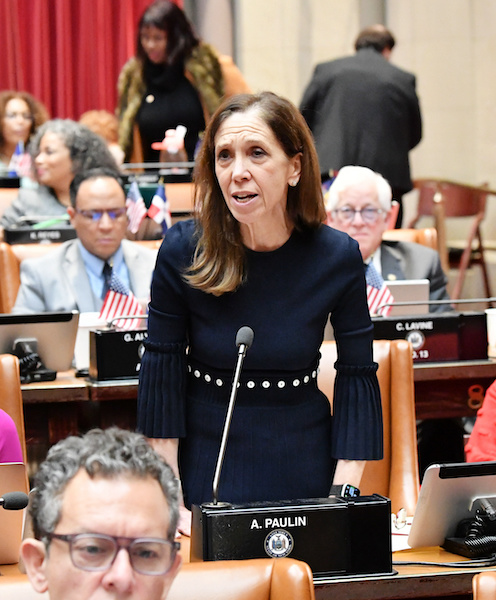Assembly Member Paulin’s Legislation Making the Dissemination of Deepfake Images a Crime Passes in the New York State Legislature
- Friday, 16 June 2023 15:54
- Last Updated: Friday, 16 June 2023 15:54
- Published: Friday, 16 June 2023 15:54
- Joanne Wallenstein
- Hits: 1864
 Assemblymember Amy Paulin’s (D-Scarsdale) legislation (A.3596A/S.1042A) to protect residents from the harm of “deepfake” images disseminated in online communities has passed in the New York State Legislature. Her legislation makes their nonconsensual use a criminal offense, and now awaits the signature of Governor Hochul to be signed into law.
Assemblymember Amy Paulin’s (D-Scarsdale) legislation (A.3596A/S.1042A) to protect residents from the harm of “deepfake” images disseminated in online communities has passed in the New York State Legislature. Her legislation makes their nonconsensual use a criminal offense, and now awaits the signature of Governor Hochul to be signed into law.
“Deepfakes” are fake or altered images or videos created through the use of artificial intelligence. Many of these images and videos map a face onto a pornographic image or video. Some create a pornographic image or video out of a still photograph. These pornographic images and films are then posted online without the consent of those in them – often with devastating consequences to those portrayed in the images.
Following passage of the bill, Assemblymember Paulin said, “Regardless of the motivation for creating and distributing deepfakes - whether it was to humiliate, coerce, control or distress an individual – under this legislation the perpetrator will be prosecuted under the NYS Penal Code and if convicted spend up to a year in jail. Deepfakes can have a lifelong impact on someone because it’s on the web, and doesn’t come off easily. That’s why we needed to update the law to make their online dissemination a criminal offense.”
According to recent cybersecurity data, deepfakes are growing exponentially - doubling every six months. Deepfakes also disproportionally victimize women. Of those currently circulating online, research shows that over 90 percent depict non-consensual porn featuring women.
There is also significant evidence that intimate image abuse harms women more and in different ways than it harms men. Researchers have found that the mental health impacts on women are akin to those suffered by victims of sexual assault. These effects include anxiety, depression, post-traumatic stress disorder, and worsening physical health and financial harm either through time off work or through withdrawing from online spaces. In some cases, there have been reports of attempted suicide and self-harm.
When women’s images are posted onto pornography sites, they are humiliated, shamed and often receive demeaning and frightening messages from men who have viewed their images. Women have also reported feeling unsafe and constantly on alert while in public or around men they don’t know and trust. The threat of violence is exacerbated when personal information about the victim is shared alongside the image.
This type of intimate image abuse has also been used as a mechanism for “shutting women up.” Some women may shut down their blogs, avoid websites they formerly frequented, take down social networking profiles, refrain from engaging in online political commentary, and choose not to maintain potentially lucrative or personally rewarding online presences.
“The sharing of and threats to share these images can be used in abusive relationships as a mechanism of coercion and control,” said Assemblymember Paulin. “Women in abusive relationships often already find it extremely challenging to leave or go to the police for a myriad of reasons. It is clear that intimate image abuse makes leaving abusive relationships and reporting the perpetrator harder still. This legislation is a first step to prevent the proliferation of deepfakes, amending the Penal Code so that they can be prosecuted as the serious offenses they are.”







